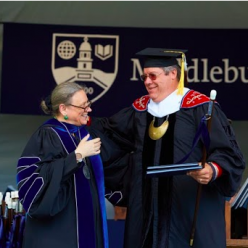by Sarah Mines ‘24.5 and Phoebe Davis ‘24.5
Land Acknowledgement of Middlebury College
“Middlebury College sits on land which has served as a site of meeting and exchange among indigenous peoples since time immemorial. The Western Abenaki are the traditional caretakers of these Vermont lands and waters, which they call Ndakinna, or “homeland.” We remember their connection to this region and the hardships they continue to endure. We give thanks for the opportunity to share in the bounty of this place and to protect it.”
Our Project
Acknowledging and honoring the original caretakers of the land we reside on pays tribute to the rich history and culture of Indigenous communities. It is important to recognize that their existence has been actively questioned and threatened by the dominant powers of the United States since its conception. Contemporary Western understandings of land ownership attempt to erase centuries of Indigenous history, cultural practices, and civilizations. Land Acknowledgements are a crucial part of beginning the process of reconciliation and reinforce the commitment to recognizing the presence and future of Abenaki in the Vermont region and Indigenous peoples of North America, wherever you may be.
Framework for writing from a non-Indigenous perspective:
Historically, white European colonizers used language in their writing that created a false and generally negative perception of Indigenous peoples in North America. These harmful stereotypes and depictions laid the foundation for concepts like Manifest Destiny; it was the settler’s God given right to take over and “develop” the land since they believed Indigenous people were not advanced enough to do so properly. Today, while the idea of overt racism towards Indigenous people may be looked upon with disapproval, there are still covert ways non-Indigenous people can perpetuate racism through their writing about Indigenous peoples and Indigenous culture. This should not discourage non-Indigenous people from learning more and wanting to help. There is, however, a point where boundaries can be crossed and “good intentions” can have a negative impact, so great care must be taken when writing. The process of writing about Indigenous peoples, culture and experiences as non-Indigenous authors involves understanding how to use language respectfully and critically reflecting on one’s own privilege, point of view and intentions. The role of non-Indigenous writers, authors, editors and lawyers when it comes to writing about Indigenous peoples and their experiences and culture should be primarily to work with, not on behalf of, and most of the time should not be undertaken without permission.
Summary of 25 Methods of Decolonization:
In our exploration of Indigenous storytelling and performance, we have used Linda Tuhiwai Smith’s 25 Methods of Decolonization from her book Decolonizing Methodologies as a framework for our conversations and reflections. These methods provide twenty-five different ways that Indigenous people can reclaim narratives and contribute to research in authentic, impactful ways. Tuhiwai Smith says that it is imperative to utilize indigenous research methodology because “reclaiming, reformulating and reconstituting indigenous cultures and languages” requires “an ambitious research programme [that is] relentless in its pursuit of social justice” (142). Some of these methods include the sharing of testimonies, storytelling, revitalizing Indigenous languages, and writing. In our class’s research, interviews, and writings, we have referenced Tuhiwai Smith’s Methods to further examine the ways that our topics reject colonial narratives and reclaim, or indigenize, elements of Abenaki practices and culture.
Importance of topics and how they relate to decolonization:
Here you will find a body of posts on the Abenaki people, a First Nation tribe in Ndakinna (known today as New England and Canada), and their relationship with Middlebury College. Our goal is to write about the Abenaki, their culture, and their interactions with settler institutions, such as Middlebury and the State of Vermont. By doing this, we hope to assemble a collection of research, interviews, and photographs about the Abenaki and their history for future reference and as an educational tool at the request of Chief Don Stevens of the Nulhegan Band. While the topic of each blog varies, all emphasize the enduring importance of Indigenous presence and examine the different methods employed in the process of decolonization. For example, blog posts cover topics such as potential steps that Middlebury College could take towards reconciliation with the Abenaki, the Abenaki Language School led by Jesse Bruchac, honorary degrees given to Abenaki tribe members, and Abenaki involvement in the Knoll at Middlebury.
We give thanks to the Abenaki artists, storytellers, and culture-bearers who helped us craft these blogs. Please read on to learn more about the relationship between the Abenaki people and Middlebury College.
Further Reading:
On Writing about Indigenous Peoples as a Non-Indigenous Author
Storytelling as a Method of Indigenization
Works Cited
Smith, Linda T. Decolonizing Methodologies: Research and Indigenous Peoples. London, Zed Books, 1999.
